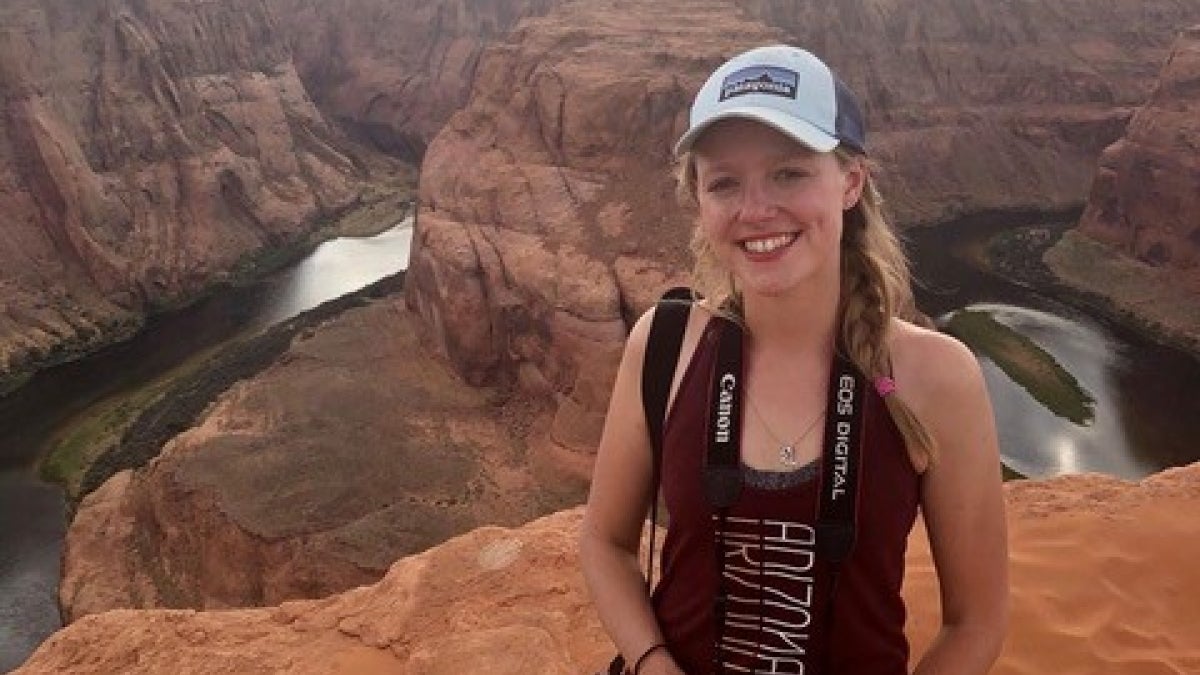Love of the mountains and geology leads graduate to a PhD

Alexandra Pye stands on the edge of a high ridge above Horseshoe Bend in Page, Arizona. Photo courtesy Alexandra Pye
Editor’s note: This story is part of a series of profiles of notable fall 2022 graduates.
Alexandra Pye has always had a love of the mountains and learning about the natural world. Originally from London, Pye says conducting fieldwork in the Alps for her undergraduate degree was what inspired her to further her education.
“I was intrigued by the fact that small details in rocks recorded the formation of the Alps. I could keep learning more about the formation of landscapes I loved, and maybe do similar work for a career,” said Pye. This fall, Pye will graduate with a PhD in geological sciences from Arizona State University's School of Earth and Space Exploration.
“My love of geology originated from my love for being outside — I was surprised by how much I have enjoyed being in the lab, which quickly became where I conducted most of my research. I have found the analytical part of my research fascinating and a definite high point of my PhD,” said Pye.
Pye experienced the insurmountable amount of work to complete for graduation and advised others, “Take one day at a time and keep chipping away at it; eventually you will be on the other side, and it will all be worth it! When it does feel incredibly hard, remember why you started doing the degree in the first place and always ask those around you for help if you need it.”
Her advisor, Kip Hodges, foundation professor in the School of Earth and Space Exploration, recognized that determination and enthusiasm.
“Alex has been an exemplary student over a period that has been unusually challenging for all,” said Hodges. “Her work involved extensive field work in Nepal at a time when the pandemic restricted worldwide travel. Her work is also very laboratory intensive, and COVID-related laboratory access issues meant that she had to develop an aggressive analytical campaign when she could get back at it. Through it all, she maintained an extremely positive outlook and completed an exceptional and unusually broad dissertation project.”
Pye credits Hodges for teaching her a great deal about geology, science in general, statistics, writing and how to navigate the academic world. Her decision to apply to ASU was based on her desire to work with Hodges.
After graduation, Pye will remain at ASU as a postdoc, studying lunar meteorites to learn about the timing of impact events on the moon. We asked her to share a few thoughts about her time here at ASU.
Question: What was your favorite spot on campus, whether for studying, meeting friends or just thinking about life?
Answer: My favorite spot on campus is the green area by the Biodesign buildings and ISTB4.
Q: If someone gave you $40 million to solve one problem on our planet, what would you tackle?
A: I would definitely tackle climate change. We are reaching the point of no return, and not enough is being done to avoid this.
More Science and technology

Ancient sea creatures offer fresh insights into cancer
Sponges are among the oldest animals on Earth, dating back at least 600 million years. Comprising thousands of species, some with…

When is a tomato more than a tomato? Crow guides class to a wider view of technology
How is a tomato a type of technology?Arizona State University President Michael Crow stood in front of a classroom full of…

Student exploring how AI can assist people with vision loss
Partial vision loss can make life challenging for more than 6 million Americans. People with visual disabilities that can’t be…